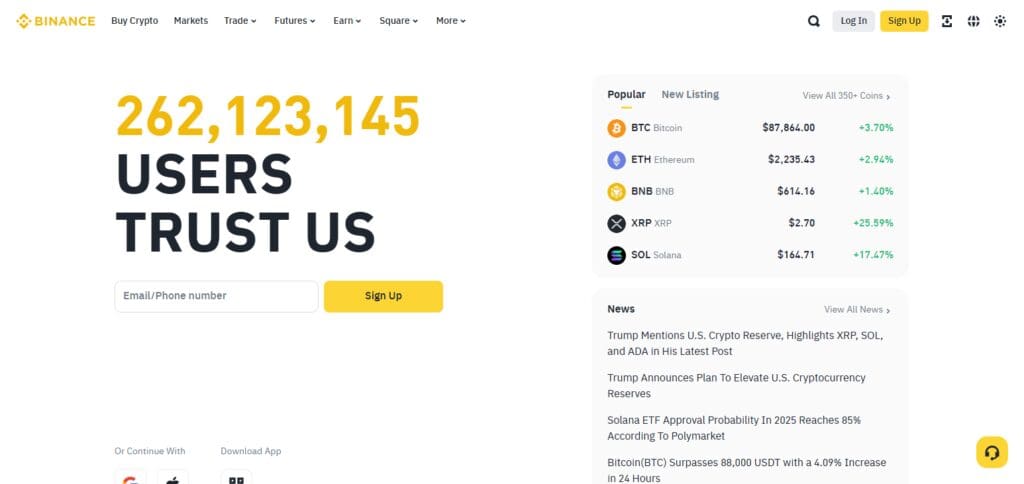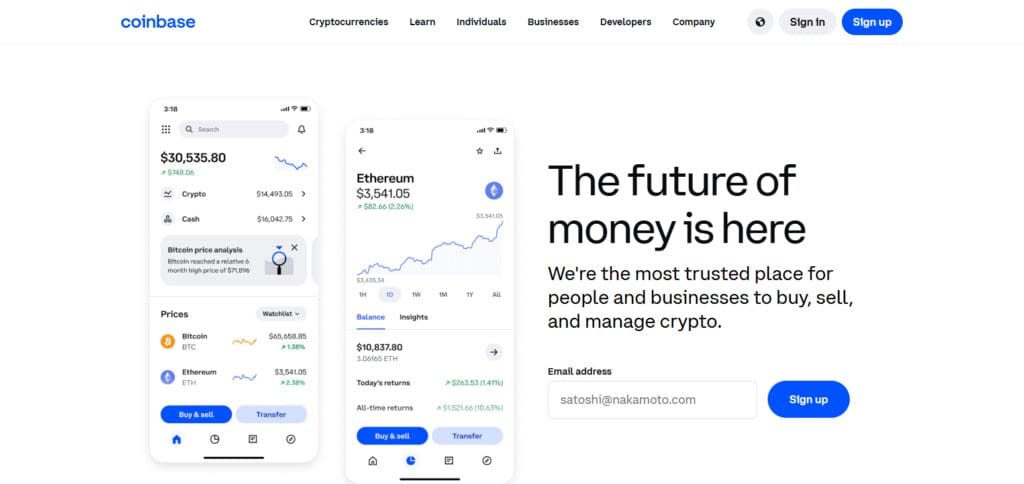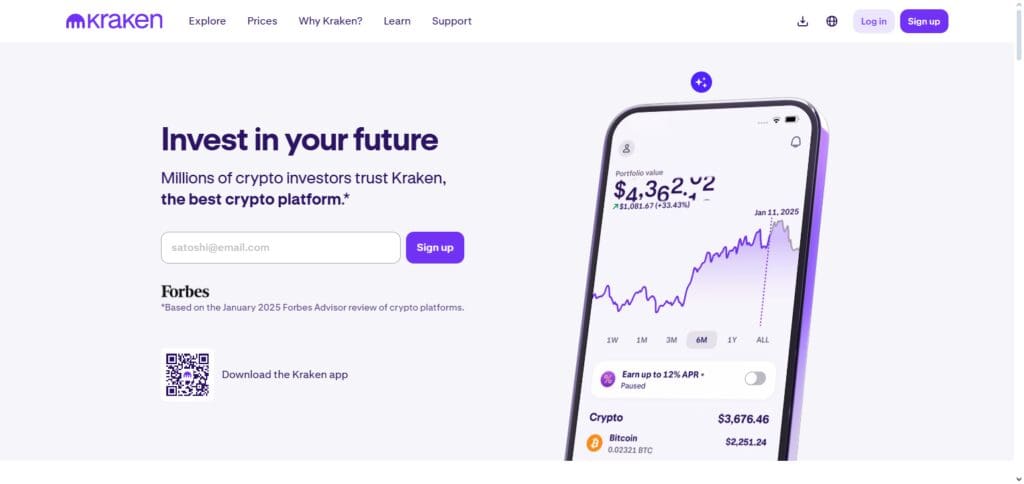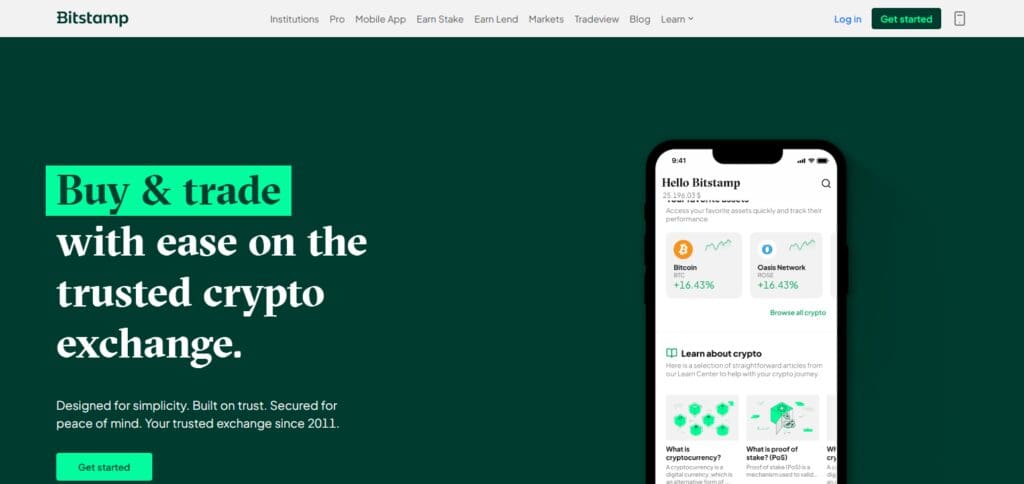In this article, I will discuss the How to Pick a Reputable Crypto Exchange by looking at the most relevant details like security measures, fees, available cryptocurrencies, trading pairs, liquidity, customer service, and community ranking.
Selecting the appropriate exchange is very important for a secure and convenient trading process. Using these guidelines can help you find a suitable platform that accommodates your trading style.
What is Crypto Exchange?
Cryptocurrency exchange is a web-based hub where users can purchase, sell, and trade crypto assets such as Bitcoin, Ethereum, and many others. They serve as intermediaries and provide matching services for buyers and sellers, and also provide spot trading, futures trading, and even staking.

They include centralized exchanges (CEXs) where users are required to trust a third party, and decentralized exchanges (DEXs) where peer-to-peer trading occurs.
Decentralized exchanges cut out the middleman, allowing users to trade directly with each other. Different exchanges offer different levels of security, fees, liquidity, and assets which makes the selection crucial for traders.
How to Pick a Reputable Crypto Exchange Steps by Steps

The best crypto exchanges can vary greatly depending on how the user intends to use it.
You wouldn’t want your assets to be at the mercy of a new exchange’s seemingly arbitrary values and measures. When selecting one that is right for you, pay close attention to these defining properties:
Regulation and Compliance
Licensing: The exchange’s operations must be properly registered under relevant financial authorities jurisdiction in the region they are in eg SEC in the US, FCA in England or MAS in Singapore.
KYC/AML Policies: Good exchanges employ quite literally KYC policies to prevent fraud and illegal activities. These policies include a Know Your Customer policy and Anti Money Laundering provisions.
Security Measures
Two-Factor Authentication (2FA): Anyone new to these exchanges should look for accounts that offer at least 2FA. This is a great way to secure your account further.
Cold Storage: A significant portion of user funds should be stored in cold wallets (offline storage) to protect against hacks.
Insurance: Coverage for security breaches is guaranteed depending on the exchange. Some offer this type of insurance while others don’t.
Past Security Record: It is key to research the exchange’s history to determine if they had any significant breaches or hacks.
Reputation and Reviews
User Reviews: Platforms such as Trustpilot and Reddit offer reviews on a lot of these exchanges, which should definitely be checked before using them.
Industry Reputation: Look for exchangers that are older than a few years and that are generally reputable in the crypto community.
Transparency: Reputable exchanges are open about their team, operations, and fees.
Supported Cryptocurrencies
Variety of Coins: Make certain the exchange provides support for the cryptocurrencies that you wish to trade.
New Listings: There are exchanges which are famous for their list of new and prospective projects where you can invest in altcoins.
Trading Fees and Costs
Fee structure: Research how much of the trading fees, withdrawal fees, and even deposit fees are charged on various exchanges.
Hidden costs: Take note of hidden costs like elevated spreads or inactivity fees.
Liquidity
High Liquidity: Go for an exchange with a high trading volume and liquidity to help you buy or sell assets quickly without significant price slippage.
User Experience and Interface
Ease of use: If you are new to the platform, it should be easy to use.
Mobile App: Check if the exchange provides a functional mobile app for convenient trading.
Customer Support: Ongoing support from responsive customer support via live chat, email, or phone is important.
Geographic Restrictions
Availability: Be sure that the exchange operates from your country and accepts your local fiat currency.
Restrictions: Some users may be affected by restrictions of certain exchanges because of their location or country of residence.
Other Aspects
Rewards Programs and Staking: Some exchanges offer staking or earning interest for maintaining specific cryptocurrencies.
Premium Resources for Trading: Advanced traders should consider exchanges that include supplemental features for margin trading, futures, and advanced charting.
Training Materials: A trustworthy exchange supports users by offering informative materials that explain the basic concepts of crypto trading.
Communication and Trust
Regular Communications: The exchange should continuously inform users of scheduled maintenance, additions, features released, and security updates.
Participative Users: It is a positive indicator if the users are active on social media platforms, blogs, and forums.
Reputable Crypto Exchanges
1. Binance
Binance is regarded globally as one of the largest and most favorite cryptocurrency exchanges.
It is famous for having a broad list of cryptocurrencies, low fees on trades, and providing advanced tools for trading, making it suitable for both starters and seasoned traders alike.

However, Binance has been scrutinized by regulators from multiple countries, which may affect the accessibility of the platform for some users.
It has a wide range of digital currencies, options on futures, and staking, but these regulatory challenges must be taken into account before considering its use.
2. Coinbase
Coinbase is regarded as one of the most beginner friendly exchanges and therefore is perfect for those new to crypto space.
Being based in the United States helps because Coinbase operates under regulations and therefore offers a platform that is safe and features an easy-to-use interface.

It has numerous cryptocurrencies and allows linking to bank accounts for easier conversions to crypto from fiat. This exchange, however, has higher fees than its counterparts.
It is renowned for being the first regulated exchange which is why they offer educational material for newbies to familiarize themselves with crypto and for good reason, it is a safe although expensive beginner friendly option.
3. Kraken
The online exchange is ideal for crypto investors, thanks to its reputation for reliability and security – Kraken. The Kraken crypto exchange is known to support a wide range of digital currencies, has advanced trading options, and boasts a unique comprehensive security feature.

It is one of the few exchanges that provide margin trading, futures trading, and staking. As one of the most trusted platforms for buying bitcoin, it also provides excellent customer support as well as plenty of educational materials.
However, the advanced interface may be a bit too complex for beginners. Overall, the credibility of Kraken as a financial service provider is cemented by its compliance with international regulations.
4. Gemini
As a recognized US-based cryptocurrency exchange, Gemini operates within legal frameworks and provides services with a primary focus on compliance and security.

Assets kept in Gemini’s hot wallets are covered by insurance, making it a secure venue for cryptocurrency trading. While Gemini’s fee structure is less competitive than its peers, the platform is well liked, particularly by institutional users.
Consumers are now able to benefit from a savings account which allows crypto users to earn interest on certain currencies. Gemini offers an intuitive interface, as well as a copious supply of educational materials for beginners.
5. Bitstamp
Bitstamp is among the oldest, and most trustworthy cryptocurrency exchanges. It is recognized for its exemplary liquidity, and low fees, making it perfect for traders.
The platform supports a great selection of fiat-to-crypto and crypto-to-crypto pairs as well.

Bitstamp is regulated and provides a secure, user-friendly interface, however, it does not support as many altcoins as bigger exchanges such as Binance.
As there is no confusion to which currency can be traded, Bitstamp helps and serve traders with straightforward needs who prefer an exchange with an established history and reliable customer service.
Fees and Trading Costs
Crypto exchanges have different fees set, which impact profitability in either way. These set costs include:
Trade Fees
Charged per each execution or a per action charge, either as a maker fee (for liquidity being added) or a taker fee (for liquidity being removed). Usually ranges between 0.1% to 0.5% per trade.
Deposit and Withdraw Fees
dependant on payment method, some exchanges set fees for crypto or fiat deposits/withdrawals.
Spread
The distance between the buying price and the selling price per asset. Common in brokers and instant exchanges.
Network Fees
required for blockchain transactions, goes up when the network is congested.
Traders can lower incurred costs by switching to a lower fee exchange.
Available Cryptocurrencies and Trading Pairs

Available Cryptocurrencies & Trading Pairs stands out in particular while looking for a new cryptocurrency exchange platform.
Supported Cryptocurrencies
Leading exchanges support many coins like Bitcoin (BTC), Ethereum (ETH), and many altcoins or even stablecoins. Some also include newer or less popular tokens.
Trading Pairs
Transactions with cryptocurrencies can only be done if they have directly trading pairs, for example, BTC/USDT, ETH/BTC, or ADA/USDC. A greater number of trading pairs improve the ease of trading.
Liquidity
There is generally enhanced liquidity for well-known largest cryptocurrencies which allow you to trade and execute orders at lower prices instantly.
Fiat Support
Some exchanges allow direct swapping of cryptocurrencies with fiat options like USD, EUR, or KES.
Customer Support & Community Trust
Customer Support
Trustworthy exchanges provide 24/7 support through either live chat, calls, or emails. The response times, the speed at which general issues are solved, and availability of support in different languages are all important. Some platforms have help and FAQ sections, and may also feature AI chat bots.
Community Trust
Built on a strong reputation due to security, transparency, and user experience. Check Trustpilot, Reddit, Telegram as well as social media for reviews and trust. Stay away from exchanges that have an abundance of negative comments about withdrawal, hacking, and lacking customer support.
Conclusion
Evaluating a trustworthy exchange involves considering various factors such as security, fees, assets, liquidity, customer support, and community reputation. Look out for platforms with strong security, low fees, and high liquidity for fast and easy trading.
Take note of customer support responsiveness and the overall reputation of the platform within the crypto community. Platform reviews, regulatory compliance checks, and feature testing can assist a user in deciding. An exchange that is chosen poorly often comes with issues around reliability and security which negatively impacts the trading experience.










